CORPORATE ACTION: Amazon
Amazon UK Stops Using Single-Use Plastic Packaging For Products Shipped From FBA
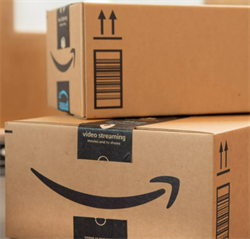
Amazon has stopped using single-use plastic delivery bags in the UK for orders shipped from the online retailer’s fulfilment centers. The move includes products sold by third-party sellers that use Fulfillment by Amazon (FBA) and will use recyclable paper bags and cardboard envelopes. However, there are occasions where customers may still receive purchases in plastic packaging, such as products sold by third-party vendors who ship directly to customers and items that come in single-use plastic packaging from manufacturers.[Image Credit: © Amazon ]
CORPORATE ACTION: Boots
Boots Says It Will Stop Selling Plastic Wet Wipes In UK
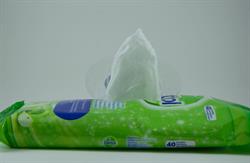
UK pharmacy chain Boots announced it will stop selling wet wipes that contain plastic fibers. The health and beauty retailer said the move is part of efforts to reduce non-biodegradable waste. The company has sold more than 800 million wet wipes in the UK, selling about 15% of all beauty face wipes in the country in 2021.[Image Credit: © Christine Sandu]
CORPORATE ACTION: Clorox
Glad Innovates For Sustainability In Australia, Canada, and US
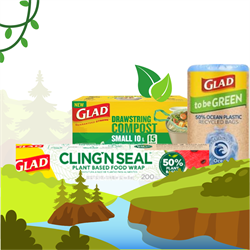
Clorox’s Glad brand of trash bags and plastic food containers has highlighted its efforts to provide consumers with sustainable products while maintaining quality and performance. In Australia, Glad has collaborated with the Oceanworks marketplace for recycled plastic to develop the Glad to be Green 50% ocean-bound plastic recycled trash bags. Also, the company has introduced the Cling’N Seal 50% plant-based food wrap in the United States, while helping to prevent 3 million tons of waste from ending up in landfill by 2030.[Image Credit: © The Clorox Company]
CORPORATE ACTION: Henkel
Henkel Partners With BASF To Replace Fossil Carbon Feedstock With Renewables
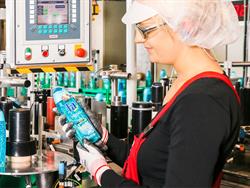 Henkel has partnered with BASF to replace fossil carbon feedstock with renewable feedstock for most products in the consumer goods company’s European Laundry & Home Care and Beauty Care divisions. The collaboration is expected to run for the next four years after the success of a 2021 pilot with Henkel’s Love Nature cleaning and detergent brand. The partners expect to replace about 110,000 tonnes of ingredients each year with renewable feedstock through BASF’s certified biomass balance process. This will help Henkel prevent around 200,000 tonnes of carbon dioxide emissions.[Image Credit: © Henkel]
Henkel has partnered with BASF to replace fossil carbon feedstock with renewable feedstock for most products in the consumer goods company’s European Laundry & Home Care and Beauty Care divisions. The collaboration is expected to run for the next four years after the success of a 2021 pilot with Henkel’s Love Nature cleaning and detergent brand. The partners expect to replace about 110,000 tonnes of ingredients each year with renewable feedstock through BASF’s certified biomass balance process. This will help Henkel prevent around 200,000 tonnes of carbon dioxide emissions.[Image Credit: © Henkel]
CORPORATE ACTION: Procter & Gamble
Procter & Gamble India Recycles More Plastic Waste Than It Uses For Packaging In 2022
 Procter & Gamble India has achieved “plastic waste neutral” status in fiscal year 2022. The company collected, processed, and recycled more than 19,000 metric tons of plastic packaging waste, a figure that exceeds the amount of plastic packaging it sold in one year. The company said it has been collaborating with recycling partners in 75 cities in the country, with plastic waste sent to recyclers, waste-to-energy facilities, and cement kilns. Also, the company has been reducing the volume of packaging material it uses.[Image Credit: © Procter & Gamble]
Procter & Gamble India has achieved “plastic waste neutral” status in fiscal year 2022. The company collected, processed, and recycled more than 19,000 metric tons of plastic packaging waste, a figure that exceeds the amount of plastic packaging it sold in one year. The company said it has been collaborating with recycling partners in 75 cities in the country, with plastic waste sent to recyclers, waste-to-energy facilities, and cement kilns. Also, the company has been reducing the volume of packaging material it uses.[Image Credit: © Procter & Gamble]
CORPORATE ACTION: Unilever
Unilever Partners Lazada For Easy Green Sustainable E-Commerce In Southeast Asia
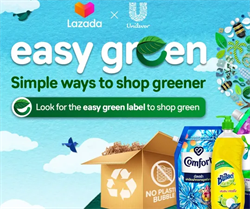 Unilever marked 2022 Earth Day by collaborating with online retailer Lazada to launch the Easy Green e-commerce sustainability program. The program is aimed at helping consumers in Southeast Asia adopt an “eco-friendlier lifestyle” and will help determine what consumers think are most important with online shopping and develop related solutions. To qualify for the Easy Green program, home care products need to be at least 99% biodegradable, have at least 50% renewable carbon sources, reduce greenhouse gases by at least 10%, and use better, reduced, or no plastic packaging at all.[Image Credit: © Unilever plc]
Unilever marked 2022 Earth Day by collaborating with online retailer Lazada to launch the Easy Green e-commerce sustainability program. The program is aimed at helping consumers in Southeast Asia adopt an “eco-friendlier lifestyle” and will help determine what consumers think are most important with online shopping and develop related solutions. To qualify for the Easy Green program, home care products need to be at least 99% biodegradable, have at least 50% renewable carbon sources, reduce greenhouse gases by at least 10%, and use better, reduced, or no plastic packaging at all.[Image Credit: © Unilever plc]
Surf Announces Plan To Stop Selling Laundry Packs With Plastic Scoops In Australia

Unilever’s Surf laundry brand will start selling powder laundry packs without plastic scoops in Australia in June 2022. Unilever said the move is expected to remove 7.7 tonnes of plastic in circulation in the country every year. The company is calling on consumers to save their existing scoops to use.[Image Credit: © Unilever plc]
CORPORATE ACTION: Other
SC Johnson Promotes PET Recycling To Celebrate Earth Day In Mexico City With Biobox
 In April, SC Johnson partnered with Mexico-based sustainability startup Biobox to celebrate 2022 Earth Day by promoting recycling of PET plastic containers in Mexico City. The campaign will encourage consumers to bring SC Johnson-branded plastic containers to collecting machines installed by the partners in strategic places across the city. Consumers can join the campaign by downloading the Biobox app, locating the nearest Biobox machine and scanning the QR code on the packaging, selecting the recycling mode, and placing the packaging inside the collecting machine.[Image Credit: © SC Johnson]
In April, SC Johnson partnered with Mexico-based sustainability startup Biobox to celebrate 2022 Earth Day by promoting recycling of PET plastic containers in Mexico City. The campaign will encourage consumers to bring SC Johnson-branded plastic containers to collecting machines installed by the partners in strategic places across the city. Consumers can join the campaign by downloading the Biobox app, locating the nearest Biobox machine and scanning the QR code on the packaging, selecting the recycling mode, and placing the packaging inside the collecting machine.[Image Credit: © SC Johnson]
CAMPAIGNS, COMMITMENTS & NGOs
IGD Report Calls On UK Consumer Goods Industry To Revise Approach To Packaging
.png&width=250&height=113) In the UK, the food and consumer goods industry needs to cut the amount of packaging by 20% in order to achieve the goal of reducing by half the environmental impact of packaging by 2030. IGD’s latest report, “Halving the environmental impact of the UK packaging system: How industry and key stakeholders can work together to drive positive change,” highlights three steps the market needs to take to achieve this goal. These are removing packaging, increasing recycled content, and decarbonizing current supply chains.[Image Credit: © IGD]
In the UK, the food and consumer goods industry needs to cut the amount of packaging by 20% in order to achieve the goal of reducing by half the environmental impact of packaging by 2030. IGD’s latest report, “Halving the environmental impact of the UK packaging system: How industry and key stakeholders can work together to drive positive change,” highlights three steps the market needs to take to achieve this goal. These are removing packaging, increasing recycled content, and decarbonizing current supply chains.[Image Credit: © IGD]
Single-Use Flexible Packaging Needs To Be Addressed For Faster Move To Circular Economy
.png&width=250&height=82) The Ellen MacArthur Foundation has identified several steps aimed at flexible packaging that can speed up the move toward a circular economy for plastics. Single-use flexible packaging must be eliminated, and all parties should innovate away from using it. Packaging design, infrastructure, and policy should incorporate “unprecedented efforts” to ensure any single-use flexible packaging that cannot be currently recycled can be circulated.[Image Credit: © Ellen MacArthur Foundation]
The Ellen MacArthur Foundation has identified several steps aimed at flexible packaging that can speed up the move toward a circular economy for plastics. Single-use flexible packaging must be eliminated, and all parties should innovate away from using it. Packaging design, infrastructure, and policy should incorporate “unprecedented efforts” to ensure any single-use flexible packaging that cannot be currently recycled can be circulated.[Image Credit: © Ellen MacArthur Foundation]
CONSUMER & PUBLIC OPINION
Global Survey Reveals Consumer Preference For Restaurants With Eco-Friendly Takeouts

Among 7,000 consumers worldwide surveyed by Censuswide for Deliverect, 43% said they are willing to pay more for takeout orders in restaurants with visible sustainability practices. Restaurants need to communicate with customers their sustainability efforts, with 56% of respondents saying they want to know how restaurants are working to make their deliveries and takeouts more eco-friendly. Also, 54% said they would rather order from restaurants that cut excess packaging from deliveries, while 56% said they prefer restaurants that use eco-friendly packaging instead of single-use plastic.[Image Credit: © Yu Hosoi]
Sustainable Packaging Offers Brands Venue For Conversation With Consumers
 Consumer research by New Hope Network’s NEXT Data & Insights team has revealed that consumers are familiar with sustainable packaging concepts, such as recyclable, reusable, and recycled plastics. However, it is not clear how well consumers understand complex issues surrounding packaging. That could be an opportunity for brands and the natural products industry to engage in a conversation with consumers regarding sustainability in packaging. Some of the steps that brands can take include explaining the steps taken to make cardboard and paper packaging 100 percent recyclable; saying where and how packaging is compostable; and saying where recycled plastic comes from.[Image Credit: © Informa Markets]
Consumer research by New Hope Network’s NEXT Data & Insights team has revealed that consumers are familiar with sustainable packaging concepts, such as recyclable, reusable, and recycled plastics. However, it is not clear how well consumers understand complex issues surrounding packaging. That could be an opportunity for brands and the natural products industry to engage in a conversation with consumers regarding sustainability in packaging. Some of the steps that brands can take include explaining the steps taken to make cardboard and paper packaging 100 percent recyclable; saying where and how packaging is compostable; and saying where recycled plastic comes from.[Image Credit: © Informa Markets]
EMERGING IDEAS, THEMES & TRENDS
Homethings Launches Household Cleaning Liquid In Powder Form
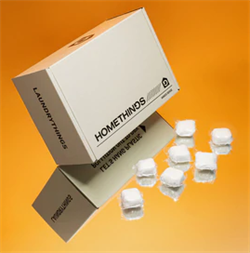
Homethings has launched Washupthings powder-to-gel household cleaning liquid exclusively at Waitrose retail stores. The company developed the product in partnership with Innovate UK. The cleaning liquid comes with a reusable pump bottle and two refill sachets. Each sachet comes with 17.5 grams of active ingredients that turn into 350ml of cleaning liquid when mixed with water.[Image Credit: © Homethings]
Copyright 2026 Business360, Inc.

